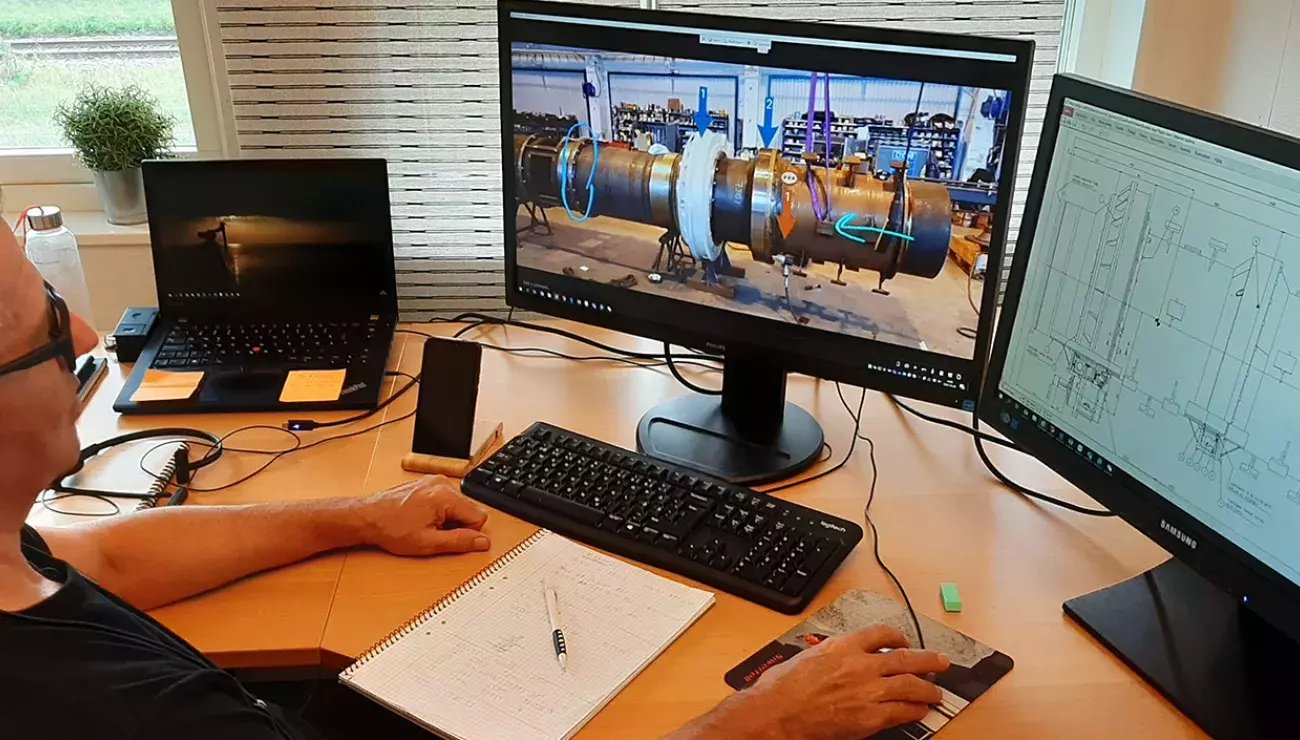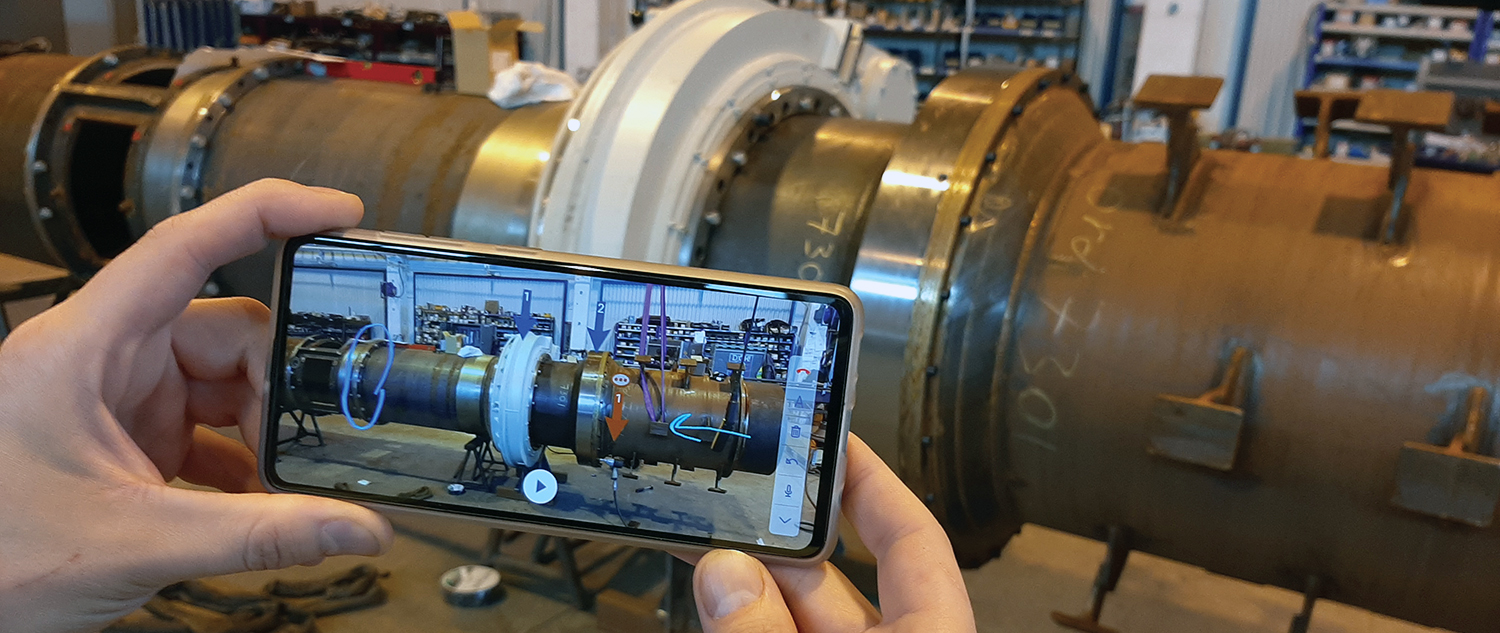
Remote expert assistance enabled with augmented reality platforms
3 Mar 2021Recent history has never known a time that customers needed to have reliable, expert service support more than this one. The dry bulk handling and processing industry feeds, powers and builds the world. The wheels of our society that have to keep turning; service is critical.
“Although the current situation forces a change in approach in some circumstances, we have always considered our customer service role as essential,” says Daniel Frostberg, Service Director, Bruks Siwertell. “We know that our machines are expected to work hard day-in, day-out, with the same levels of performance for years. Good service is therefore absolutely essential to our role as an original equipment manufacturer and supplier in the industry, but so is our ability to offer an expert-eye as quickly as possible when it is needed,” continues Frostberg.

Change on the horizon
Timely and significant developments in digital technology are driving fundamental industry advances, including the use of augmented reality to help support customers remotely with expert assistance from original equipment manufacturers.
“Even before the Covid-19 crisis, our service role has been moving towards new technologies,” he notes. “The rapid advances in digitalization, connected machinery, software development and augmented reality platforms have brought about an extraordinary change in capabilities.
“We are able to leverage our service expertise with the advantages of these new platforms. This helps bridge service support to our customer’s right now, while travel is restricted, but also, as part of our commitment to continuous service development, then adopt them as a widely-available service capability, which we can continue to use in future customer communications.
“The direction we are moving is a positive shift,” Frostberg says. “It is likely that there will always be a need for on-the-ground service, surveyor visits and expert inspections, but historically, call-outs have happened because the interface between the surveyor and the operator has not been good enough or accessible enough to accurately assess a situation remotely. It is these cases that can now potentially be avoided, reducing the environmental load from flight travel, and substantially reducing the cost of service visits for the operator.
Digital service portfolio
Bruks Siwertell’s digital service portfolio is expanding. It builds on advanced simulation software used as a ship unloader training tool within the company and built-in connectivity with the Dell Edge Gateway, an Internet of things (IoT) device, for next-generation Siwertell road-mobile unloaders.
The first models to feature the Dell Edge Gateway are 15 000 S next-generation Siwertell road-mobile unloaders; the 5 000 S and 10 000 S models will follow shortly. The system enables more extensive monitoring, follow-up, support and trouble-shooting through remote access. In the future, it will also be possible to analyze the data collected from a ship unloader, through a web portal, customizing remote monitoring capabilities and advancing predictive support.
“Adding to these capabilities, we now use two remote assistance platforms, Microsoft Dynamics 365 Remote Assist and TeamViewer Pilot. These provide a number of ways for an expert Siwertell product surveyor to use augmented reality to trouble-shoot and help from a distance,” explains Örjan Westerberg, Service Contract Engineer, Bruks Siwertell.
“Our surveyors can see and experience what operators can via mobile digital devices such as smartphones and tablets, or even using mixed reality goggles such as HoloLens. These visual assistance guides enable us to address a technical issue with live instructions and the ability to write notes and annotate, on a screen, highlighting the parts that need attention. It is also possible for Siwertell surveyors to communicate with customers by sending video tutorials as an explanation for a particular task.”
Connecting at every level
“An additional benefit is that these new systems overcome any language barriers. Not only do they deliver clear visual guides, which improves comprehension, but also text and other elements can be translated through the platforms. Furthermore, video calls can be recorded and stored as a back-up or used at another time for training, or to refresh an operator as to the correct approach if a similar issue occurs,” Westerberg highlights.
“We connect with customers in whatever way is most convenient to them. Sometimes a phone call is perfect, and for others we communicate across a range of different internet-based systems. The important thing is that we adapt to whatever support is needed, and these big drivers for change mean that we can access the technology to match service needs.
“New times are approaching, and new types of services are developing. While we will continue to travel as before, whenever possible, these innovative communication opportunities offer real benefits and are here to stay,” concludes Frostberg.
PLEASE CONTACT US FOR MORE INFORMATION
PLEASE CONTACT US FOR MORE INFORMATION


 Bruks-Siwertell
Bruks-Siwertell